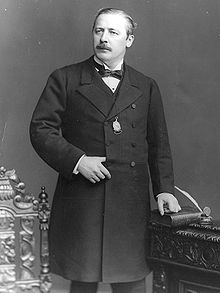Sir Evelyn Baring
|
The Right Honourable The Earl of Cromer GCB OM GCMG KCSI CIE PC FRS |
|
|---|---|

The Earl of Cromer in 1895
|
|
| 1st Controller-General in Egypt | |
|
In office 1878–1879 |
|
| Monarch | Isma'il Pasha |
| Preceded by | Office Established |
| Succeeded by | Edward Baldwin Malet |
| 1st Consul-General of Egypt | |
|
In office 11 September 1883 – 6 May 1907 |
|
| Monarch |
Tawfiq Pasha Abbas Helmi II |
| Preceded by |
Edward Baldwin Malet As Controller-General in Egypt |
| Succeeded by | Eldon Gorst |
| Personal details | |
| Born |
Evelyn Baring 26 February 1841 Cromer, Norfolk United Kingdom |
| Died | 29 January 1917 (aged 75) Westminster, London United Kingdom |
| Nationality |
|
| Spouse(s) | Ethel Errington |
| Children |
Rowland Baring, 2nd Earl of Cromer Evelyn Baring, 1st Baron Howick of Glendale Louisa Sophia |
| Alma mater |
Royal Military Academy Staff College, Camberley |
| Occupation | Military officer, politician |
| Awards | Knight Grand Cross of the Order of the Bath Member of the Order of Merit Knight Grand Cross of the Order of St Michael and St George Knight Commander of the Order of the Star of India Companion of the Order of the Indian Empire |
| Military service | |
| Allegiance |
|
| Service/branch | Army |
| Years of service | 1860–1877 |
| Rank | Major |
| Unit | Royal Artillery |
Evelyn Baring, 1st Earl of Cromer GCB OM GCMG KCSI CIE PC FRS (/ˈkroʊmər/; 26 February 1841 – 29 January 1917), was a British statesman, diplomat and colonial administrator. He was British controller-general in Egypt during 1879, part of the international Control which oversaw Egyptian finances after the 1876 Egyptian bankruptcy. He later became the agent and consul-general in Egypt from 1883 to 1907 during the British occupation prompted by the 'Urabi revolt. This position gave Baring de facto control over Egyptian finances and governance.
Baring's programs led to limited economic development in Egypt in certain areas, but deepened its dependence on cash crops and structural underdevelopment, as well as regressed many of its social developments (such as the state school system). His policies are considered to be representative of colonial "white man's burden" attitudes.
Baring was the ninth son of Henry Baring and his second wife, Cecilia Anne (née Windham). The English branch of the Baring family descends from John (born Johann) Baring, who emigrated from Germany in 1717. John's son Sir Francis was the founder of Barings Bank. Henry was the third son of Sir Francis. When he died in 1848, 7-year old Evelyn was sent to boarding school. When he was 14, he entered the Royal Military Academy, graduating at 17 with a lieutenant's commission in the Royal Artillery. He was initially posted to a battery on the island of Corfu.
...
Wikipedia
